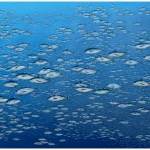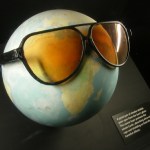
So, I have been thinking about the brainy echidna since its debut a couple weeks ago in the NYTimes. Bestowed upon it, was probably one of the nicest descriptions about an animal ever written:
...an immaculately private nocturnalist with a surprisingly well-endowed brain.
It seems to me that monotremes (egg laying mammals) are as cool as Syngnathidae (the family of fishes that include the seahorse and the unique feature of male pregnancy). In the case of the echidna, "they lay leathery eggs, as reptiles do, but then feed the so-called puggles that hatch with milk." For seahorses and…
Not to beat a dead horse (although that horse could possibly help alleviate the demand for tuna) but I wanted to clarify some of the arguments against eating seafood or, rather, in favor of marine life. Here I address some specific (and broader) questions in response to my recent posts.
Isn't there sustainably harvested seafood out there we can eat?
In theory, we should be able to harvest seafood sustainably. I am not ruling out this possibility, although most scientists are very hard pressed to name several truly sustainably managed fisheries (note on the rule of sustainability: things…
Because food issues are "one of the most interesting social movements afoot right now", I thought I would continue the discussion over whether we should give up eating seafood just a bit longer and point out the recent post at Animal Planet asking if we should boycott seafood altogether? Why is giving up seafood so unpalatable (other than for the obvious reason that some people find it delicious)? I am sure some people would find manatee meat tasty, too. Does that mean we should eat them to extinction?
Whether we should continue eating seafood is a hot topic this week. While I was arguing (again) that we should give up eating seafood, Mark Bittman at the New York Times had a nice piece on how seafood has changed through his lifetime and how the days of "see it/eat it" are over. However, he stops short of a strong stance and tries to justify his continued seafood consumption:
One could argue, as I sometimes do (mostly to myself), that one shouldn't eat fish at all, fearing that if fish lovers begin consuming those few remaining species that are not in trouble -- sardines, mackerel, squid…
Today (which, as happenstance would have it, also happens to be World Ocean Day) the environmental and conservation news site Mongabay.com ran an interview with me on why we should stop eating seafood. I think that if we can get people to feel about fish the way they feel about birds it should be easier to save them...
In some ways, [fish] are not that different from birds and, as anyone who has ever been to England knows, there is no shortage of sentiment for avian species. Fish often travel in flocks and flash beautiful colors. Like the albatross, tunas cover remarkable migratory distances…
Remember our old friend surimi?
I am looking for people who love surimi or hate it. Those who can remember their first time eating it (knowingly or not). Those who think it's delicious. Those who find it revolting. It would be useful for an article I am working on...
Molded surimi lobsters:
There are obvious hazards associated with forgetting, such as angry women (think birthdays and anniversaries) and the shifting baselines syndrome, where we come to accept degraded environments as 'natural'.
Forgetting about the past is particularly dangerous when it comes to making decisions about the future. I think this was summed up well in an article on Alzheimer's titled Probing a Mind for a Cure in The Philadelphia Inquirer.
"Their frame of reference is disappearing," said Christopher Clark, director of Penn's Memory Discorders Clinic and Bob Moore's doctor after his diagnosis [with…
A blogpost over at GOOD magazine* reviews a new book on veganism, applauds the book for its flexible approach, and says we should "give up trying to guilt people into not eating any meat." The post mentions the environmental impacts of meat, which are indeed significant (according the the UN, rearing cattle produces more greenhouse gases than driving cars), but does not venture much further in the realm of why there is a guilt campaign around meat eating (which, I would argue, has been a fairly weak campaign -- the potential for gruesomeness hardly fulfilled at all).
If it is not yet clear…
We know jellyfish are on the rise in the world's oceans but who knew jellies would make it into a field in Oxfordshire? At 600ft., this jellyfish is the world's biggest...
I wanted to share renowned fisheries biologist (and my supervisor*) Daniel Pauly's lecture at the Smithsonian Natural History Museum last week, which kicked off the International Marine Conservation Congress. I particularly enjoyed his ending, which discussed the potential operating systems for the interface between humanity and Planet Earth...
*But not for too much longer... I submitted my dissertation on Friday and look forward now to blogging with greater frequency.
I remember back in my teenage years unpacking the car during a vacation and singing a little tune I made up and envisioned turning into an entire Broadway musical (unfortunately, you cannot hear the catchy tune that went along with it):
Stuff.
We have too much of it: stuff.
We still want more of it: stuff.
It's tough to have so much stuff.
And, as the ever-resourceful Mike Hirshfield of Oceana pointed out to me at the recent IMCC meeting when we were talking about the post on The Story of Stuff, George Carlin did the original Stuff Story in this stand-up comedy routine from 1986:
I am currently attending the International Marine Conservation Congress (so please pardon my long absence) and wanted to quickly share some new ideas on how technology could contributions to conservation.
Erwin Brunio from Japan's Graduate School of Marine Science and Technology (itself an interesting concept) presented on how enforcement in Philippino marine protected areas is being assisted by:
...the creation of anonymous community watchers scattered among islands armed with mobile phones to report violations. The innovation is the presence of an intermediate structure between watcher and…
President Obama gives an inspiring commencement speech at Arizona State University fitting for anyone feeling guilty about privilege, the poverty of ambition, and the insufficiency of material culture...
Part 1:
Part 2:
Part 3:
The New York Times ran a great little profile on a great little video released in 2007 called The Story of Stuff. This 20-minute film created by former Greenpeace employee Annie Leonard has made its way around the globe and into many classrooms, where its animation and succinctness encourages discussion. And guilt.
According to the New York Times article, Rafael de la Torre Batker, age 9, was riding in the car one day with his parents in Tacoma, Wash., and wondered whether it would be bad for the planet if he got a new set of Legos.
Some parents are not pleased with the film, though. One…
This is a headline I can easily imagine will appear in the next decade or so.
As skyscrapers replace skylines and concrete replaces trees, I believe art is going to play an ever-greater role in society.
We know that nature has psychological benefits. Studies show that spending time in natural environments can 1) reduce stress and 2) focus attention (hence all the hoods in the woods programs). There is no doubt that art also has similar benefits*.
It is not just that film, theatre, and paintings are an urban phenomenon. They are an urban phenomenon in part because the urban environment…
I think animal sounds are sorely underutilized in music.
I have thought that ever since first hearing the lovely introductory sounds in Lemon Jelly's A Tune for Jack (2001):
I wondered: why don't more bands do this? The sounds of animals are good for the soul and, as animals become less and less a part of our daily lives due to urbanization and population declines, it is deeply pleasing to get a supplement of their sounds...
In their song Furr (2008), Blitzen Trapper emulates the call of a loon with a small toy water pipe:
Luckily, there is an even better source than a water pipe. The…
Check out my new blog Guilty Planet and please join in with your thoughts on conservation...
Check out this work by Chris Jordan that helps us visualize quantitative information using photography. His series, called Running the Numbers II, is a commentary on global mass culture, is now showing at the Winsor Gallery in Vancouver.
This new series looks at mass phenomena that occur on a global scale. Similarly to the first Running the Numbers series, each image portrays a specific quantity of something: the number of tuna fished from the world's oceans every fifteen minutes, for example. But this time the statistics are global in scale, rather than specifically American.
One work is…
Just as we have renamed fish to make them more marketable, there is a push in conservation (and science in general) to change certain uncommunicative terms to more lucid or dramatic ones. As an article in the NYTimes titled Seeking to Save the Earth, with a Thesaurus points out, it might be useful to replace "global warming" with "our deteriorating atmosphere", especially since conservationists (note: a shift from "environmentalists") are up against coal companies promising "clean, green coal".
In the same way the liberal party needed to begin using frames to manipulate public opinion (as…





